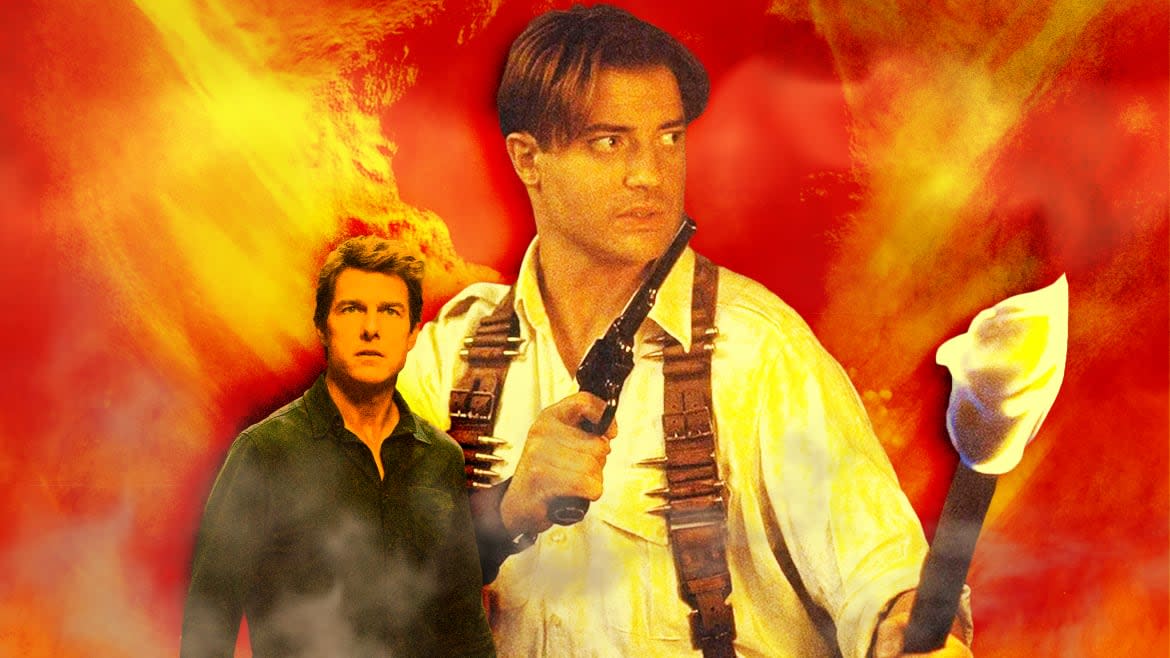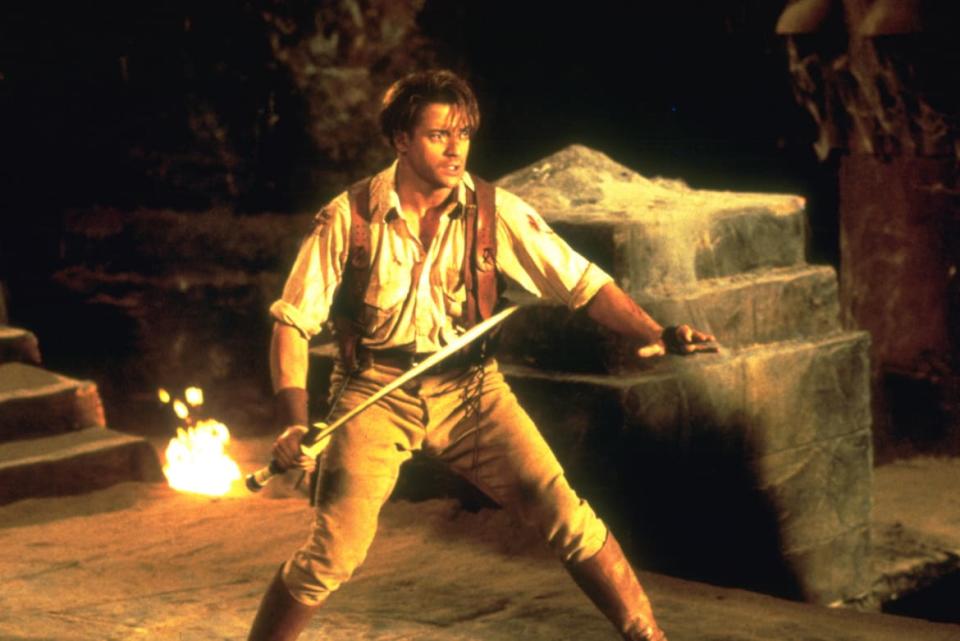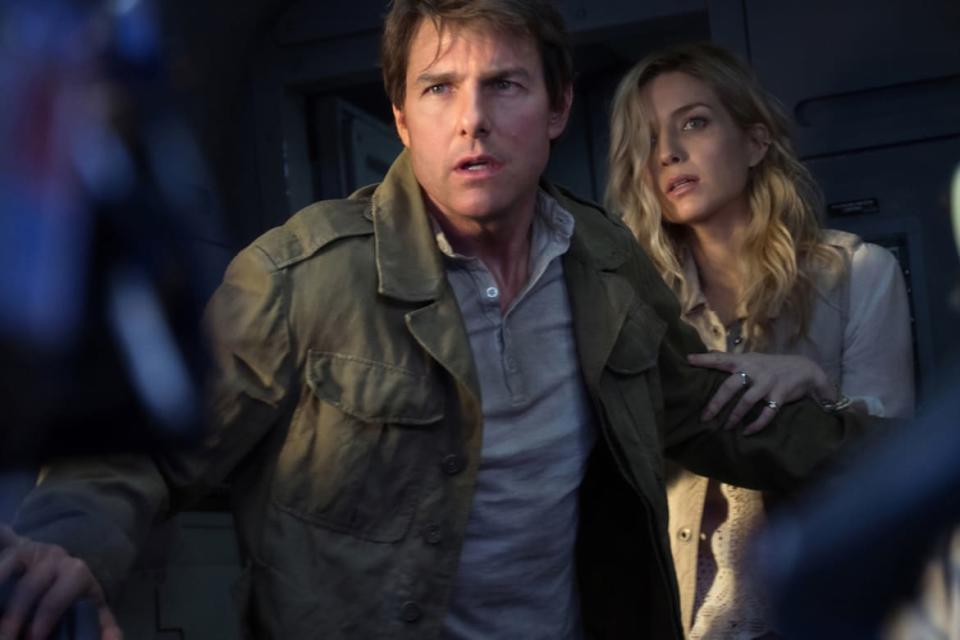Revealed: Brendan Fraser—Not Tom Cruise—Was Always Top Pick for ‘The Mummy,’ Director Says

Filmmaker Stephen Sommers always wanted to make a mummy movie. The problem was, he didn’t know if anyone actually wanted to see it.
“I was really nervous,” Sommers tells The Daily Beast ahead of this month’s 25th anniversary of his surprise '90s hit The Mummy. “I was in post-production and thought, ‘Oh crap, I’ve made a mummy movie.’ I loved the genre… the action, adventure, romance and horror, and I loved the original Mummy movies too but for 40 years, they’d made fun of mummies. You can unwrap them, outrun them, use them as Christmas wrapping… I suddenly thought, ‘Oh my God. Just because I love mummy movies, maybe other people won't.”
Thankfully, he had little to worry about. Released on May 7 1999, Sommers’ take on The Mummy was a sweeping adventure harkening back to the swashbuckling stories of old Hollywood. Mixing sand-set excitement, witty humor, an unlikely dose of romance and some then-groundbreaking CGI effects, his film not only made worldwide stars of Brendan Fraser, Rachel Weisz, and John Hannah but became one of the highest-grossing movies of the year, spawning a new franchise and changing the way Hollywood’s summer tentpoles were released.
That said, its road to success was trickier to navigate than an ancient tomb. Before audiences met chiseled hero Rick O’Connell (Fraser), Egyptologist Evelyn Carnahan (Weisz), her plucky brother John (Hannah), and the recently resurrected Imhotep (Arnold Vosloo)—a cursed high priest determined to reunite with his bride (Patricia Velásquez)—Hollywood had struggled for a long time trying to bring The Mummy back to life.
“I’d wanted to make my version for years,” says Sommers, recalling his route to the director’s chair. “I love the original Boris Karloff movie. As a kid it took me to ancient Egypt and Cairo in the ’30s and my imagination took over.” For almost a decade prior, Universal had asked numerous filmmakers for a new Mummy movie, from Clive Barker and Joe Dante, to Wes Craven and George A. Romero. By the time Sommers arrived, they were up for trying anything. “They were so sick of developing this thing for nine years that they didn’t even hear my initial pitch,” says Sommers. “My agent just called them up and said I was interested in writing and directing.”
The call was enough to secure a meeting with producers Jim Jacks and Sean Daniel where Sommers laid out his vision. “They always tell you to keep your pitches to 15 or 20 minutes; I pitched for an hour and 20 because I had every single thing figured out. For years they were trying to do a literal remake of the Karloff movie. It was going to be low-budget and filmed on sound stages,” says Sommers, revealing that “the previous draft to mine all took place in Los Angeles. There was a mummy exhibition at a museum. The mummy breaks out of his sarcophagus and literally at one point goes down Melrose Avenue and Venice Beach.”

Brendon Fraser in The Mummy in 1999.
Sommers instead took inspiration from a different movie, one that was influential in shaping Indiana Jones. “I love Raiders [of the Lost Ark] but my all-time favorite movie is Captain Blood. I know [Steven] Spielberg was very influenced by that movie. It had lots of action and swashbuckling but it’s very well written and cinematically beautiful,” says the director, foreshadowing the grand dune shots featured in The Mummy. “That afternoon, Universal called and said ‘We want you to go for it’—I think because they just weren’t getting excited about doing a remake of the original. So I went off and did it.”
As production began, Sommers was buoyed by some good fortune. For starters, when his cast and crew arrived in Morocco (the film also shot in Egypt, Jordan and Pinewood Studios), they were met by an omen. “We were out in the desert and an albino camel was born—and that was good luck,” he smiles, explaining how local culture impacted his animal extras. As if that wasn’t enough, an internal staff reshuffle at Universal gave Sommers the rarest of things: a healthy budget and zero hassle. “[The new boss’s] attitude was ‘if this movie is a bomb, blame it on the last guys,’” he laughs. “They never gave me notes—and nobody from the studio ever showed up while shooting. They just let me do my thing.”
Should Brendan Fraser Give Back His Oscar After ‘Killers of the Flower Moon’?
In the years since The Mummy’s release, stories about the film’s production have made their way online, some of which were recently brought back to the fore after Fraser’s recent Oscar win for The Whale. Looking back, Sommers is keen to clear a few of them up—especially the ones about casting.
“I read somewhere recently that we originally went to Tom Cruise and Brad Pitt [for the role of Rick O’Connell]—but no. My editor read the first draft and right away said, ‘Your lead guy is Brendan Fraser,” he remembers. “We needed a guy who could throw a punch, take a punch, had a wink in his eye and a sense of humor, and there weren’t a lot of actors at that point who did that. Brendan can make fun of himself and goes all out. He was the only one considered from the get-go. [Universal] weren’t looking for a star; the title was the star.”
As for that recent story about the time Fraser nearly died when a hanging scene went awry, Sommers assures us it wasn’t nearly as dangerous as clickbait headlines would have you believe. “Brendan put the rope around his neck and got too into it,” says Sommers, sharing his recollection of the experience. “He’s a very eager guy and was like ‘tighten it up… make it tight around the neck.’”
When the stunt began, gravity did its thing and cut off his carotid arteries. “What he didn’t realize is that it cuts off blood flow and he knocked himself out. Obviously, if we’d have walked away he could have died—but we were all standing there,” assures Sommers. “He woke up and didn’t even know what had happened. It was more of a humorous thing,” he continues, “and Brendan did it to himself so he can’t blame anybody.”

Tom Cruise and Annabelle Wallis in The Mummy in 2017.
Wikipedia and IMDb tell stories of sandstorms impacting the shoot but the director says they were more “magical than annoying.” Meanwhile, rumors that the film’s cast had kidnapping insurance taken out on them while shooting in Morocco is also news to Sommers. “My sister sent me an article that said ‘Stephen Sommers took out some sort of insurance on all the actors and never told them.’ No,” he confirms. “Studios probably take out insurance in case someone dies halfway through but I certainly wouldn’t be the one to take out insurance on any of my actors. We were very well protected in Morocco.”
The only issues Sommers does recall involve heatstroke and British soccer star David Beckham: “I was running from one set to the other in the desert and somebody said I better slow down or I’ll get heatstroke. I felt fine but all of a sudden it hit me. I went from feeling completely normal to feeling like I was drunk,” recalls Sommers. “While filming the first Mummy, Beckham got tossed out [of the 1998 World Cup],” he adds, explaining that the incident had a clear impact on his largely British crew: “Everyone was really depressed the next day.”
When it came time to release The Mummy, expectations were low. Plus, it wasn’t the only effects-laden release to hit screens in spring 1999. “[Universal] didn’t know what kind of movie they had,” explains Sommers. “We came out two weeks before The Phantom Menace which of course was going to be ginormous because there hadn’t been a Star Wars movie in years.”
The Mummy opened to $43.4 million its opening weekend (compared to $64.8 million for The Phantom Menace two weeks later) and went on to gross $416 million worldwide on an $80 million budget. “It was such a big hit that from then on, the first weekend of summer for movies was considered the first weekend of May,” Sommers explains.
Tom Cruise Is Still Great, Even After ‘The Mummy’
Sommers’ movie spawned two direct sequels including 2001’s The Mummy Returns and 2008’s Weisz-less The Mummy: Tomb of the Dragon Emperor. It even gave Dwayne “The Rock” Johnson his first leading role in 2002 spin-off The Scorpion King. Cut to 2024 and cinema finds itself in an age of legacy sequels and reboots. Universal tried a remake with Cruise in 2017 as part of its since-scrapped Dark Universe monster franchise but it didn’t stick. So why does Hollywood have such trouble resurrecting The Mummy?
“I think you really have to love the character,” reasons Sommers, referencing the 1932 original. “It was magical and took me back to ancient Egypt and sometimes people don’t get why you would love something like that. Not to disparage the Tom Cruise one but to me, it was kind of a zombie movie. It’s not a mummy movie. I just didn’t get it.” The filmmaker remembers how, when Rick finally defeats Imhotep in his film, audiences had mixed emotions—something that he feels is key: “He’s an evil guy but you kind of feel sorry for him. He’s doing what he’s doing for love so you understand where he’s coming from.”
As for whether he’d ever consider revisiting Rick and Evelyn’s story? “I go back and forth,” he says, contemplating the idea. “I love the characters and that I got to do two movies with them. There’s a whole new group of people [at Universal] doing different stuff. I can’t imagine revisiting it but never say never,” he adds. “I did enjoy making those movies.”
Get the Daily Beast's biggest scoops and scandals delivered right to your inbox. Sign up now.
Stay informed and gain unlimited access to the Daily Beast's unmatched reporting. Subscribe now.

 Yahoo Movies
Yahoo Movies 
